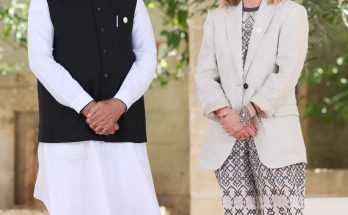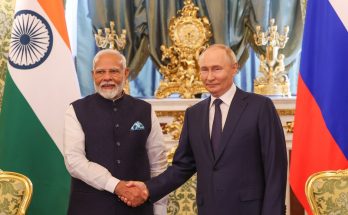The May 23 election in Vietnam will bring in a new National Assembly that is expected to strengthen the Southeast Asian nation’s economic rejuvenation, which has continued on an ascending path despite the pandemic. There will be many new faces in the 15th National Assembly (NA), but what will not change are foreign policy priorities, including Vietnam’s commitment to building stronger relations with India, a rising Asian power that has made Hanoi a key plank of its Act East policy.
Covid-compliant

Millions of masked men and women, adhering to strict Covid protocol, cast their votes in the election on May 23 that has reaffirmed Vietnam’s commitment to democracy. Around 69.2 million registered voters are expected to select 500 deputies from 866 candidates for the parliament. They will also vote for members of the people’s councils at provincial and district levels.
The elections in Vietnam are being held in the shadow of the Covid, but all efforts have been made by the authorities to ensure that the democratic exercise is Covid-compliant and safe. Voters as well as election officials have been instructed to strictly wear masks and adhere to norms of social distancing while casting ballots to choose their representatives.

The rigour and thoroughness with which the elections in Vietnam have been organised is exemplary and could serve as a model for countries planning to hold elections amid Covid in the near future. The logistics of holding elections is truly impressive: 84,767 election groups have been set up for 69,198,594 voters across the country. According to Minister of Home Affairs Pham Thi Thanh Tra, organisations in charge of the voting have been set up in localities, with 63 election committees at the provincial level, 682 others at the district level, and 10,134 at the communal level.
In the run-up to the elections, government leader briefed voters about COVID-19 prevention and control efforts. In order to ensure the success of the election and minimise impact from the pandemic, the NEC has issued many documents directing and guiding the election activities in the context of the pandemic, including those instructing the making of voter lists and voting methods for voters undertaking quarantine in localities affected by COVID-19.
In an interview with Vietnam News Agency (VNA), NA General Secretary and Chairman of the NA Office Bui Van Cuong lauded close coordination among all relevant agencies in cities and provinces nationwide to ensure polls are free, fair and transparent. He stressed that many localities have taken creative initiatives in election communications, including posting the list of voters on social media, providing feedback books for voters to make adjustments and supplements to the voter lists, while making preparations of equipment and infrastructure serving the election.

The elections in Vietnam are being closely followed around the world, with many lauding Hanoi’s skill in holding Covid-appropriate elections. Vietnamese people are showing stronger interest in the National Assembly and issues related to the powerful agency, UNDP Resident Representative in Vietnam Caitlin Wiesen said. She lauded Vietnam’s efforts in ensuring safety for the important event amid the fourth wave of COVID-19 outbreaks.
Impact on India-Vietnam relations
The parliamentary elections in Vietnam intersect with a higher trajectory of growth in India-Vietnam relations that was reflected in the December 2020 virtual summit between the prime ministers of the two countries. The upward curve in bilateral relation was supported by the party’s top leadership that emerged from the 13th National Congress of the Communist Party of Vietnam in January this year. In April, in a power transition, Pham Minh Chinh was voted as the country’s next Prime Minister, and outgoing PM Nguyen Xuan Phuc was appointed the new President.
Building on recent trends, the National Assembly elections in Vietnam is expected to reinforce and further cement across-the-board consensus in the ASEAN country to scale up India-Vietnam relations to new heights. There is a huge amount of goodwill for India among Vietnamese political class and civil society. Once the new parliament takes charge, one can expect an intensification of parliamentary exchanges between the legislatures of India and Vietnam. There is already a robust tradition of parliamentary exchanges between India and Vietnam. The two-way visits of parliamentary delegations and friendship groups have been going on for years, and will receive a fresh impetus after the Vietnam parliamentary election.
Increasing parliamentary exchanges is part of the larger trend in India-Vietnam relations to broad-base the relationship by enhancing people-to-people and cultural contacts.
On the foreign policy front, the new National Assembly is expected to provide parliamentary support to the government’s foreign policy, which is focused on strengthening key strategic partnerships, including the one with India, to spur the ascent of Vietnam on the global stage and bring concrete benefits to people of the country. The National Assembly is expected to reaffirm Vietnam’s correct foreign policy of multilateralization and diversification. This will help enhance Vietnam’s position in the international arena and help advance its forward-looking agenda as a permanent member of the United Nations Security Council. In this context, the partnership with India, a key strategic partner and a permanent member of the UN Security Council, will complement Vietnam’s goals.
Going by past experience and precedent, members of the new National Assembly will also support closer cooperation with India on regional issues such as upholding and protecting freedom of navigation in South China Sea against attempts to subvert status quo in SCS. It’s important to remember that the Vietnamese National Assembly plays an important role in foreign policy and economic development by playing a proactive role in the decision-making process.

The new Vietnam National Assembly is also expected to support enhancing economic partnership with India, a major emerging economy which has managed to show reasonable growth despite the pandemic. In some ways, the stories of economic resilience of India and Vietnam intertwine. Vietnam, the emerging economic tiger of Southeast Asia, is among a handful of countries that has recorded positive economic growth during the pandemic.
One can also expect counter-pandemic collaboration to grow as there is much admiration among India’s political and policy elite at Vietnam’s deft handling of the pandemic. Underscoring its solidarity with India, Vietnam sent a consignment of 109 ventilators and 50 oxygen concentrators to India on May 21, a couple of days before the national elections. This is the first batch of the gift sent by the Vietnamese Government and People to the Indian Government and People in their fight against COVID-19, said the Vietnamese embassy in New Delhi. The second batch, which includes 100 ventilators, 183 oxygen concentrators, 800 oxygen cylinders, and 50,000 masks will be loaded into and shipped by an Indian Navy ship from Ho Chi Minh City to Chennai soon. Put together, the medical relief amounts to US$1.5 million. Significantly, most of the support in cash and in kind has been channeled through Vietnam Buddhist Sanghas and Vietnam-India Friendship Association to the Indian Red Cross Society, which underlines the importance of civil society and people-to-people relations in infusing new energy and purpose in the burgeoning India-Vietnam relations. This solidarity in crisis, coupled with a growing convergence of strategic and economic interests, will continue to power India-Vietnam relations in months and years to come.

The democratic connect between India and Vietnam is also set to strengthen in days to come. The high turn-out of voters and an atmosphere of excitement in the country signal a successful election. With the success of economic development, prevention of the covid pandemic, vitality in foreign affairs and the consensus among people as a backdrop, one can expect Vietnam to continue to rise and reaffirm its position in international arena.
Author Profile

- Manish Chand is Founder-CEO and Editor-in-Chief of India Writes Network (www.indiawrites.org) and India and World, a pioneering magazine focused on international affairs. He is CEO/Director of TGII Media Private Limited, an India-based media, publishing, research and consultancy company.
Latest entries
 India and the WorldJuly 9, 2024Defying West, India sets $100 billion trade target with Russia
India and the WorldJuly 9, 2024Defying West, India sets $100 billion trade target with Russia India and the WorldJuly 5, 2024India at SCO: Takes swipe at Pakistan for cross-border terror, pushes alternative to BRI
India and the WorldJuly 5, 2024India at SCO: Takes swipe at Pakistan for cross-border terror, pushes alternative to BRI India and the WorldJune 14, 2024Modi’s Day 1 in Italy: Bonding with Britain, France
India and the WorldJune 14, 2024Modi’s Day 1 in Italy: Bonding with Britain, France India and the WorldJune 13, 2024G7 summit in Italy: Modi to showcase India as leader of Global South
India and the WorldJune 13, 2024G7 summit in Italy: Modi to showcase India as leader of Global South






